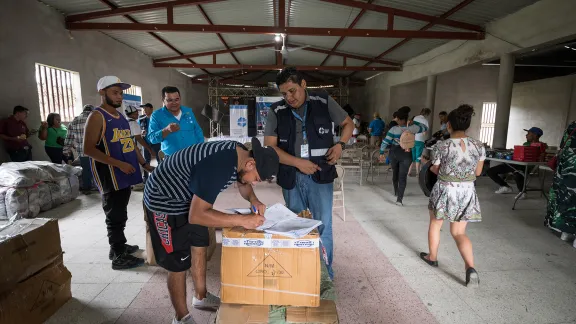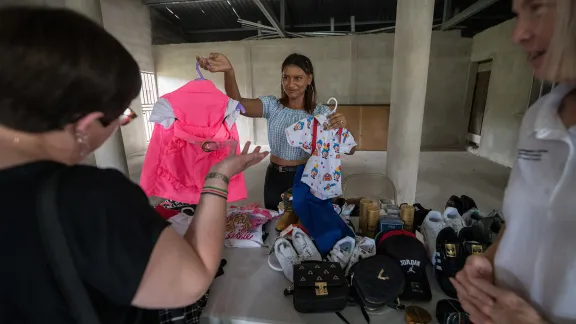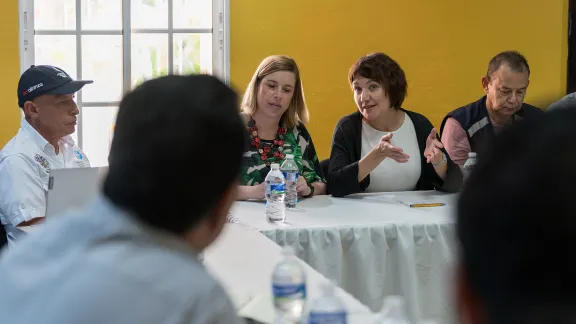LWF General Secretary Anne Burghardt witnesses the work of accompaniment and support that the church and the World Service program in Honduras are providing for migrants returning to the region

26 October 2023, El Guante, Cedros, Honduras: LWF World Service staff Lucas Reniery Funes Posadas oversees the distribution of goods intended as 'seed capital' offered to returned migrants as part of a program offering them support in starting small-scale businesses to provide for themselves. Photo: LWF/A. Hillert
LWF World Service marks forty years in Central America
(LWI) - “As a global Christian World Communion, the Lutheran World Federation (LWF) is unique in that it holds under one roof both the multifaceted work with the member churches and our humanitarian and development arm World Service”, said LWF general secretary Rev. Dr Anne Burghardt visiting Central America – where the LWF’s World Service country program now marks 40 years of service to communities in need.
The program – whose activities stretch across four countries in the region – includes projects in the areas of livelihoods, climate change, human rights and gender justice, migration, humanitarian assistance and disaster preparedness.
LWF stands out, providing support for returning migrants
In the midst of a region suffering long-term political and social challenges, including hunger, poverty, violence and the increasing impact of a changing climate, the LWF’s approach is not just to deliver specific services but to reach out a friendly hand which is ready to support and to offer hope, explains Carlos Rivera, coordinator of the LWF’s work in Honduras. A key focus of that work is supporting young people, who once took the decision to migrate in order to find better opportunities in life, but who have been deported back to their country of origin.
“Without exception, these young people come back with a need for psychosocial support, as when they come back, they are even worse off than when they left. Most of them still have family connections in Honduras, but they come back without any resources to draw on as they try to reintegrate,” Rivera adds, noting that for some migrants the journey has also entailed taking on debt that they need to find a way of paying on their return.
“To migrate is a right. We cannot say to people ‘don’t go’. But what we can do is lend a friendly hand, and an opportunity to build up their lives here in Honduras and contribute to their communities,” Rivera reflects.
Through a program centered on upholding dignity and sustaining hope for returning migrants, the LWF in Honduras this year directly supports 143 young people aged 18-30, in their efforts to build a new life in their communities.

26 October 2023, El Guante, Cedros, Honduras: Alexandra Ochoa from Guaimaca, one of a group of youth receiving support from the Lutheran World Federation World Service program, displays articles of clothing she intends to sell as part of her small-scale business. Photo: LWF/A. Hillert
The project – funded mainly by the Evangelical Lutheran Church in America, an LWF member church – includes facilitation of vocational training for returned migrants, as well as providing seed capital to help them set up their own small-scale businesses and begin to earn a living.
On 26 October, LWF general secretary Burghardt met with some of the young adults to hear about their hopes and plans for the future.
Jeferson Emahu Valle López, a participant from the municipality of Guaimaca, spoke about the accompaniment offered by the LWF, and the importance of broadening the work to reach more people like himself.
“Thank you for providing us with this opportunity. God willing it will be a success, and I hope that you will continue the work to help many of my brothers and sisters in the future,” said Valle López, who is preparing to set up a small shop selling clothes and shoes in his community.

26 October 2023 El Guante, Cedros, Honduras: Luis Pablo Calix (left) and Immey Janiel Gonzales (right) – two young returned migrants receiving support from the Lutheran World Federation World Service program – carry boxes they have picked up from a community center in El Guante, Cedros. Photo: LWF/A. Hillert
While migration is a widespread phenomenon across the region, few organizations engage, like the LWF, specifically in support of migrants who are not in transit, but returned to their countries of origin.
One who is reaping the fruits of her labors participating in the LWF program is Wendy Susely Cabrera, who has established a small beauty parlor in her home in Guaimaca.

27 October 2023, Guaimaca, Honduras: Lutheran World Federation general secretary Rev. Dr Anne Burghardt speaks during a meeting with municipal mayor of Guaimaca, Nelson Chávez. Photo: LWF/A. Hillert
While the journey has not been easy, she and her husband are today able to provide for themselves and their two daughters by both earning an income, she says.
A testimony to long-term commitment
Reflecting on the work of the Central America program, regional representative Martin Ruppenthal notes support for migrants as a key focus in the coming years, alongside prevention of gender-based violence, livelihoods, and resilience to climate change.
“In the future we see a need to dedicate our work to the so-called ‘dry corridor’ which is very much affected by climate change. We will focus on migration as well as gender justice – not just working with women but also men to help them fulfil a role that favors equality,” Ruppenthal said.
“Most importantly, the LWF’s work is one of accompaniment. We do not have endless resources, but we are there. And therefore, it is so important that we join forces with the churches, who are working with the poorest communities. This is our dedication, to be with the people, vulnerable people, poor people who otherwise have few prospects,” he added.
Reflecting on the 40 years of service in the region, Ruppenthal continued to observe that “a three-year project, for example, can be nice for three years. It’s like a fiesta. You celebrate the outcome after three years, but what happens after? As LWF we provide accompaniment much more long-term,” he concludes.
Echoing this same commitment, LWF general secretary Burghardt stressed in a meeting on 27 October with mayor of Guaimaca Nelson Chávez, that being able to restore and uphold another person’s dignity is one of the most precious things for all concerned.
“It is such a privilege to work to build hope for people in need, and as LWF through World Service, we are all part of this work,” she said.


